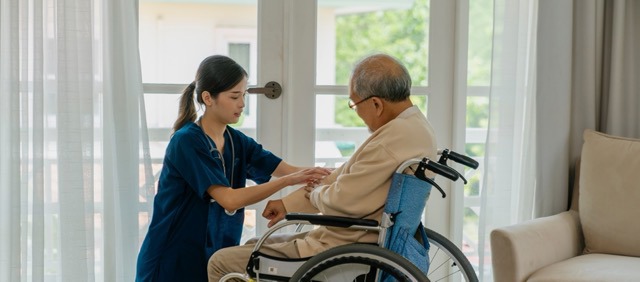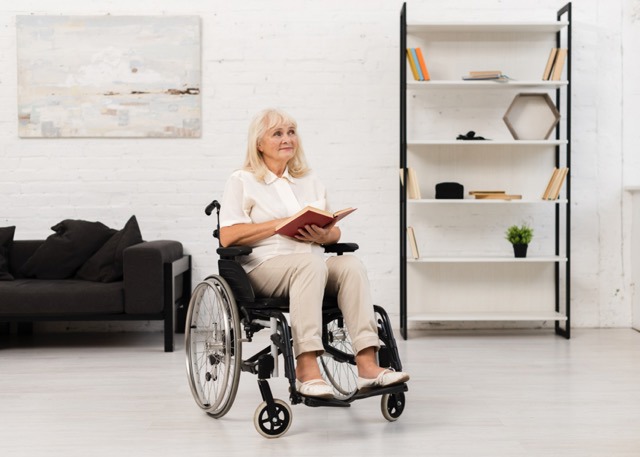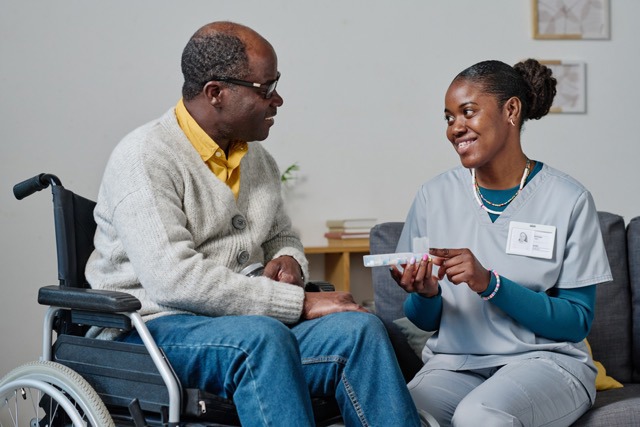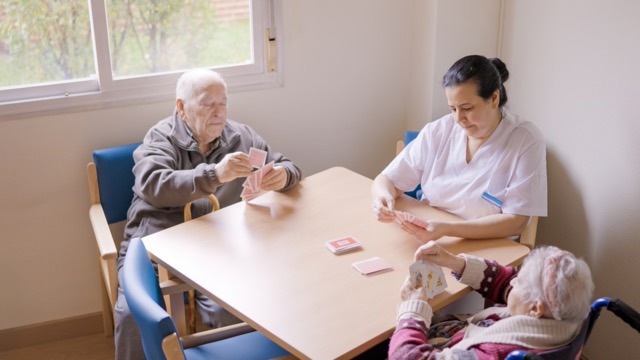24-hour care for two: advantages and how it works
When two loved ones - such as parents or an elderly couple - are dependent on help in everyday life at the same time, the question quickly arises: What can reliable, humane and affordable care at home look like?
When Franziska and Karl moved into their cosy family home twenty years ago, they could hardly imagine how quickly time would pass. Their days were filled with walks together, meetings with friends and long conversations at the kitchen table.
But age doesn't stop at the best of times. Franziska suffers from the consequences of a stroke, while Karl, with advancing Dementia had to struggle. The children lived far away and daily care became increasingly challenging. However, they did not want to be separated from each other and looked for a solution that would allow them to stay together and still receive the support they needed.
Exactly for such cases, the 24-hour-care intended for couples or family members - an innovative approach that can not only make life easier for Franziska and Karl, but also for many other families.
Concept of "double home care"
24-hour care for two refers to a care model in which professional caregivers are present in the home of the person in need of care around the clock to provide ongoing care and support. This means that two people receive the support they need at the same time without having to leave their familiar surroundings. Dual home care is increasingly being used for the care of married couples, such as Franziska and Karl, or family members who live close together.
With the Round-the-clock care for two, caregivers face specific challenges. In Franziska and Karl's case, for example, it was difficult to respond to Franziska's physical limitations and Karl's cognitive impairments. This requires flexible and adaptive care planning that is tailored to the individual health requirements of both people. The nurse must also be able to care for and support both people at the same time, which requires a high level of competence and efficiency.
Applications of 24-hour care for two
The 24-hour care for two is used in many situations and offers flexible solutions for different needs:
- Older married couples: Similar to Franziska and Karl, this form of care is suitable for older couples who wish to remain in their shared home despite health restrictions. A carer provides support with daily hygiene, administering medication and coping with everyday life.
- Family members with (chronic) illnesses: If, for example, two siblings are dependent on continuous care, dual care is also possible. It enables them to remain in their familiar surroundings and maintain their quality of life. This also applies to parents and adult children who need care together. Dual care means they can continue to live together and support each other emotionally.
- Affected persons: Impaired couples, friends or relatives can stay together by sharing 24-hour care. This promotes well-being and increases quality of life. Their individual needs are taken into account and care is adapted accordingly. Dual care is also ideal for people with different care requirements - for example, one with physical and the other with cognitive impairments.
As you can see, simultaneous home care is very versatile and adaptable. It can support those affected in individual life situations and promote their well-being. Whether it's elderly couples, siblings with chronic illnesses or impaired individuals, 24-hour care offers a comprehensive and compassionate home care solution.
Benefits of 24-hour care for two
The advantages of dual home care are manifold. In addition to the feel-good factor of being able to stay in your home, they also include the following advantages:
For Franziska and Karl, dual home care means that they can continue to live together despite their health challenges. This makes it possible for them to support each other and spend their remaining years in familiar surroundings and with a high quality of life.
Costs and subsidies of 24-hour care for two people
Financial planning plays a central role when two people like Franziska and Karl are planning their 24-hour home care would like to organize. The costs vary depending on the care model and individual care requirements.
In the classic secondment model, where a caregiver comes to your home, the monthly expenses for one person are usually between 2,000 and 4,000 euros.
Whoever relies on platforms such as noracares and selects the caregiver directly often saves considerably, as there are no high placement fees, as is usual with traditional agencies. At the same time, families can ensure that the care is precisely tailored to their needs.
There are various funding options for financial relief in both Austria and Germany. These can be used depending on the care level or degree of care, region and model:
Funding in Austria:
- Nursing Benefits depending on level-of-care
- Promoting 24-hour care
- Tax deductibility of care costs as an extraordinary burden
- Subsidies for home adaptations and care aids
- Federal state-specific subsidies (e.g. through care funds of the federal states)
Funding in Germany:
- nursing allowance depending on level of care
- Care services
- Subsidies for improving the living environment
- Relief amount
- Tax relief (e.g. deductibility of household-related services, care costs)
Through the combination of fair organization, targeted support and well-planned dual care, high-quality care can also be financed in the long term. Those who inform themselves early on can save costs without having to compromise on humanity or quality.
Precautions for dual maintenance
In order to successfully provide care for two people at home, various logistical arrangements and efficient care management are required. Franziska and Karl were therefore faced with the challenge of adapting their living situation to their new care needs.
First of all, the necessary preparations had to be made and the appropriate equipment organized. This included carefully designing the living space to ensure accessibility and safety for both people in need of care. Franziska's mobility was limited and Karl's sense of direction was deteriorating. The redesign therefore included the installation of ramps, grab rails and non-slip floors, as well as the adaptation of the bathroom facilities.
The two also included technical aids and assistance systems, such as height-adjustable beds, wheelchairs and emergency call systems. Last but not least, of course, the carer also needs a room. This was not a major problem for Franziska and Karl, as they cleared out an old children's room and refurnished it.
Technology in care for two
The technological development also plays an important role in dual care and offers numerous opportunities to make care more efficient. For example, smart home technologies and assistance systems such as motion sensors, automatic lighting and emergency call systems can help to increase the safety of those affected.
At the same time, the technical aids support the carer and make their day-to-day work easier. This is particularly helpful when caring for two people, as this requires more resources anyway and can be even more stressful. Telemedicine services also make it possible for nurses and doctors to communicate in real time. This allows doctors to pass on medical instructions directly to the nursing staff on site without having the patients in the practice.
Find a nurse
Finding the right caregiver for the dual care model requires careful selection. Platforms such as noracares offer valuable support in finding qualified caregivers who can meet the specific requirements of two people in need of care.
With noracares, families can select caregivers based on their expertise, experience and availability, but also on mutual sympathy. This structured approach makes it easier for those affected and their relatives to find the right caregiver who is not only professionally competent, but also well suited to their individual situation and needs. #
Franziska and Karl also found their caregiver at noracares and are very happy with it. This saved them the intermediate step of going through an agency and they were able to decide for themselves who they trusted.
Organization and implementation of shared care at home
The coordination of care was another important aspect. Franziska and Karl's caregiver had to organize their working hours and duty rosters in such a way that continuous care was guaranteed around the clock.
In addition, their health status and care requirements differed, which required particularly careful planning and coordination to avoid overload and ensure a high quality of care. Regular meetings and feedback loops helped to identify potential problems at an early stage and find solutions together.
In addition, the nurse always kept in close contact with Franziska and Karl's children to keep them informed about their parents' state of health and to take their wishes and needs into account.
The financing of 24-hour care for two people
Financial aspects also play an important role in dual home care. Franziska and Karl were aware that the costs of care could be significant, especially if specialized caregivers and technical aids were needed.
They therefore informed themselves about possible financial aids and support options. Care insurance, state subsidies and support programs helped to reduce the financial burden and ensure high-quality care. Franziska and Karl were also able to save money by finding their carer through noracares. This saved them the cost of an agency or other intermediary.
The 24-hour care for two is much more than a care solution - it is a dignified alternative to Nursing Home. It enables closeness, security and continuity in your own home. Especially when two people, such as a married couple like Franziska and Karl, siblings or close relatives, are dependent on support at the same time, a well-coordinated, transparent and affordable care model is needed.
The example of Franziska and Karl shows how this form of care can take the strain out of everyday life and ensure the quality of life of everyone involved - despite health restrictions. However, simultaneous home care requires careful planning: from the design of the living space and technical equipment to the selection and coordination of suitable care staff. Thanks to care allowances, state subsidies and professional care solutions, such care can be realized - without compromising on quality or humanity.
Platforms such as noracares support the search for suitable nursing staff, individually tailored to requirements. By avoiding high placement fees, the care provided is not only of high quality but also affordable.
With the right caregiver at their side, those affected experience an innovative and flexible care model that goes far beyond standard solutions. As with Franziska and Karl, it enables them to grow old together - with dignity, in their own home.
Growing old at home together? noracares provides loving 24-hour care - fair, affordable and personalized. Register now and discover!









